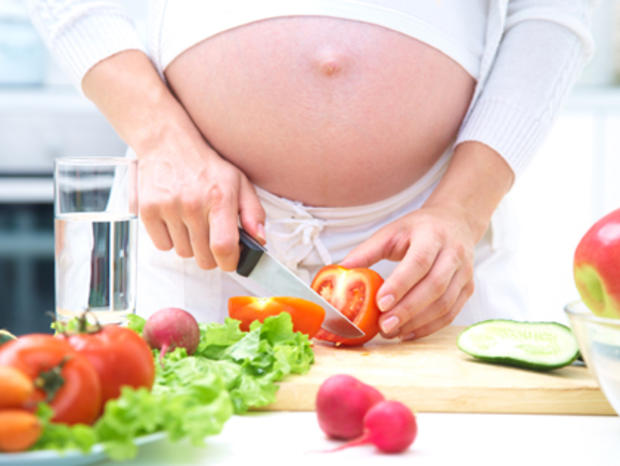The Key To A Healthy Diet During Pregnancy
Eating right during pregnancy can be tricky, especially for women who struggle with morning sickness, nausea, and other symptoms.
It's important to eat healthy foods that benefit both mom and baby, but there are certain downsides to even some of the healthiest of foods. For example, fish is important in a healthy diet and helps with fetal brain development. Pregnant women can safely eat up to 12 ounces (two servings) per week; however, they should avoid certain types of fish because they have a high concentration of mercury, which can cause mental retardation when excessive. Pregnant women should not eat big fish like swordfish, shark, king mackerel or tilefish.
Dr. Renee Goldberg, Medical Director of OB/GYN Community Practices at Beth Israel Deaconess Medical Center, also warns against unpasteurized soft cheeses or dairy products and undercooked meat, fish, or chicken, all of which can cause listeriosis. Listeriosis can lead to miscarriage or stillbirth at any point in a pregnancy.
"All meats, deli meats, and hot dogs should be fully cooked, and check dairy products for the words 'pasteurized' on the label," she says.
Caffeine is another concern, and pregnant women should limit themselves to no more than two average cups of coffee (eight ounces each) per day.
"This amount has not been shown to lead to miscarriages, but larger amounts of caffeine may be associated with miscarriages, preterm birth, and poor sleep quality," says Dr. Goldberg.
Dr. Goldberg also advises women to try not to gain too much weight from empty calories.
"Empty calories are from fats and sugars added to many foods. Staying away from soft drinks, fruit drinks, fried foods, whole milk, and desserts can go a long way to preventing excessive weight gain," she says.
And while an all-vegetarian diet can be balanced and healthy, Dr. Goldberg says that pregnant women who are vegetarians need to pay particular attention to planning meals that contain enough protein, iron, vitamin D, and vitamin B12.
For those who don't feel well during their pregnancy, doctors recommend trying to keep your stomach from getting too full or too empty.
"Luckily, I didn't experience any morning sickness with either of my pregnancies, but I did find that I felt nauseous if I didn't eat soon after I got up or if I went for a long time between meals," says Brigid Karson of West Falmouth, who has two daughters, one born earlier this summer. "I would eat two small breakfasts each day. One at about 6:30 and another at about 10."
And don't forget the fluids – it's also important to drink water throughout the day to avoid dehydration.
Above content provided by Beth Israel Deaconess Medical Center. For advice about your medical care, consult your doctor.
Posted September 2012




